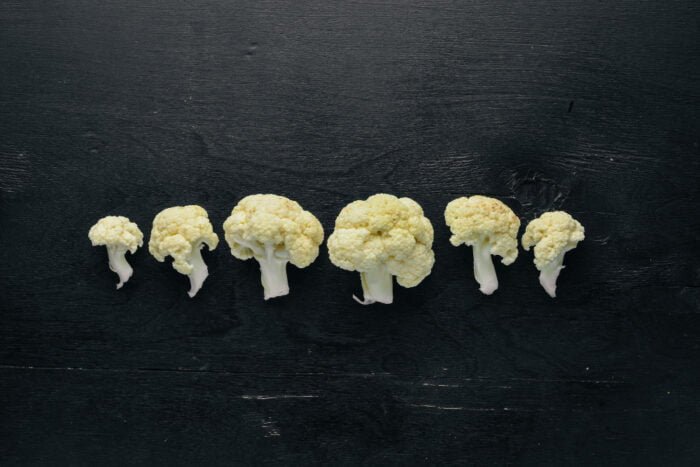It’s a low-carb staple – but so much more!
At one stage, everyone was going nuts about cauliflower! We could turn it into low-carb rice, pizza bases, mash, and more. But it’s not only low carb, the healthy vegetable we all should eat as often as possible; it’s part of the cruciferous family of royalty. What does that mean exactly? It’s a high-nutrient, dense and very low-caloric vegetable providing some of the most beautiful health benefits. It doesn’t matter if you consume purple, yellow or white variety – they all play a big part in helping us reduce disease and cancer. Cruciferous vegetables contain potent compounds which – if eaten regularly- help protect us from developing these conditions. Studies show that cauliflower helps to reduce the risk of bladder, colorectal, prostate and cervical cancer, among many others.
One: It’s going to help you lose and maintain weight
Ok, before I start here, no vegetable can give you complete immunity against weight gain – but eating more vegetables is a great starting point. Cauliflower, in particular, is very low in calories, nutrient-dense, and fibre-rich. High-fibre food takes a lot longer to digest, moving slowly through the digestive tract, which helps to keep you full and prevents cravings. Cauliflower contains 92 per cent water! So, it certainly helps aid hydration.
Two: You can easily use it as an alternative to grains and carbs regularly
Cauliflower rice is light and filling because of its fibre and water. But, if you have your heart set on going low carb or just increasing the intake of vegetables – cauliflower is versatile enough to do just that. Cauliflower has about nine times fewer carbs than rice and many more vitamins. There are so many recipes you can experiment with by using cauliflower as your main ingredients, such as cauliflower rice, stews, and pizza bases.
Three: It helps to prevent breast cancer & helps you during treatment.
By eating cauliflower, you have the potential to reduce your risk of breast cancer. Cauliflowers magic lies in these particular molecules found to promote apoptosis, inhibiting human breast cancer cells. However, cauliflower also helps to protect against cell damage DNA. Cauliflower has even been shown to be beneficial in cancer treatment. Research indicates that if you consume cruciferous vegetables at least once per week, you have a 17 per cent reduction in breast cancer risk compared to those who only ate fewer vegetables.
Four: It contains an essential nutrient that most people are missing in their diet
Eating the right foods with adequate vitamins and minerals ensures that our body functions properly. One particular that helps our metabolism synthesises DNA and maintain our cell membranes is choline. Choline also encourages brain development and the production of neurotransmitters necessary for maintaining a healthy nervous system. Choline also helps eliminate the chances of cholesterol building up in the liver. So, help protect your brain from Alzheimer’s disease and dementia by eating as many foods with choline as possible. Cruciferous vegetables contain lots of choline – and a variety to choose from.
Five: It may help support hormonal balance
All cruciferous vegetables (like broccoli and our beloved cauliflower) contain a unique plant compound called I3C. I3C acts as a plant estrogen that could help women balance their hormones by regulating estrogen. I3C also potentially lessen the risk of oestrogen-induced breast cancer and reproductive cancers that can occur in both men and women. More studies are required, but there is no harm in eating more cruciferous vegetables in your diet.
Key take away
Cruciferous vegetables are the most nutritious and cancer-fighting vegetables you can eat daily. They not only help to protect us from disease and cancer but provide that much-needed move in the right direction when it comes to weight loss & maintenance. Cauliflower is cheap, nourishing and can be used in many ways – such as making a pizza base, cauliflower rice or even baked as it is. Here are some recipe suggestions below to get you started.Spiced Cauliflower & Chickpea BowlEgg Fried RiceLow Carb BBQ Pizza
Further reading
Four ways cruciferous vegetables benefit your health and weight loss If you loved these recipes, please download your FREE Fat Loss Recipe book here.
